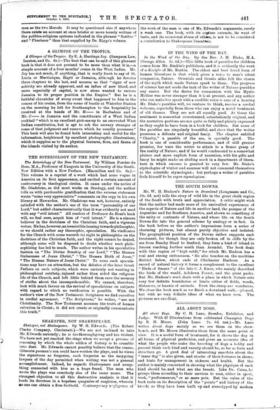THE SOTERIOLOGY OF THE NEW TESTAMENT.
The Soteriology of the New Testament. By William Poreter du Bose, M.A., Professor of Exegesis in the University of the South. New Edition with a New Preface. (Macmillan and Co. 6s.)— This volume is a reprint of a work which had some vogue in America on its first appearance, and excited a certain amount of controversy in theological circles. It came under the notice of Mr. Gladstone, as did most works on theology, and the author tells us with pardonable gratification that the veteran statesman wrote "some very appreciative" comments on the copy in his own library at Hawarden. Mr. Gladstone was not, however, entirely satisfied with the author's use of the term "personality of our Lord," but added characteristically that it was evidently not used with any "evil intent." All readers of Professor du Bose's book will, we feel sure, acquit him of "evil intent." He is a sincere believer in the doctrines of the Christian faith, and a vigorous writer. He has, however, an irresistible leaning towards philosophic, or we should rather say theosophic, speculation. He vindicates for the Church with some warmth its right to philosophise on the doctrines of the Christian faith, and the right cannot be denied, although some will be disposed to doubt whether such philo- sophising has led to much. The author writes in his speculative fashion on "The Divine Sonship of our Lord," "The Human Sinlessness of Jesus Christ," "The Human Birth of Jesus,"
The Human Nature of Jesus Christ." To some such specula- tions may have an attraction, but the debates of the later Greek Fathers on such subjects, which were certainly not wanting in philosophical subtlety, injured rather than aided the religious life of the Church, and left little behind them save the memory of strifes about the incomprehensible. We cannot, therefore, look with much favour on the revival of speculations on subjects with regard to which no verification is possible. With the author's view of the New Testament Scriptures we find ourselves in cordial agreement. "The Scriptures," he writes, "are not Christianity. The New Testament assumes the truth of human salvation in Christ; it did not create or originally communicate this truth."


















































 Previous page
Previous page